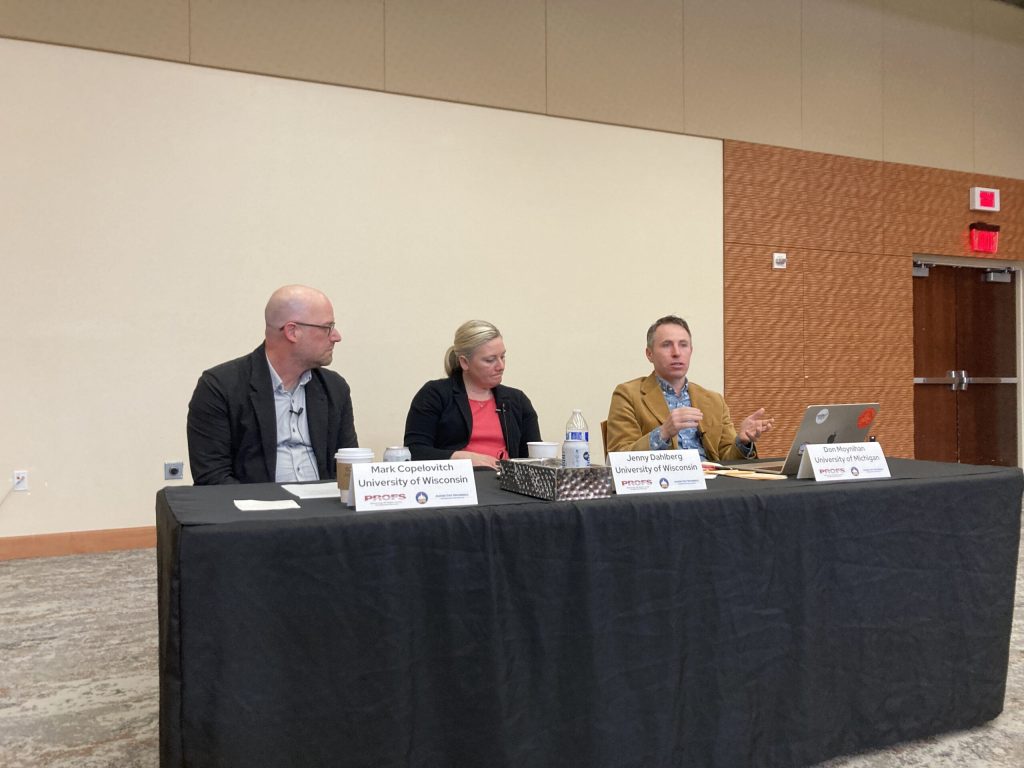UW-Madison Staff Mobilize Against Federal Attacks
Federal funding cuts damaging, can't be replaced by private dollars, they say.

Panelists at an April 24, 2025 event advocating for Universities of Wisconsin staff amid federal cuts. From left to right: UW-Madison political science professor Mark Copelovitch, UW-Madison veterinary medicine Research Administration Director Jenny Dahlberg and University of Michigan public policy professor Don Moynihan. Anna Marie Yanny/WPR
Advocates for faculty and staff at the University of Wisconsin-Madison are pushing for collective organizing against federal attacks on higher education.
At a panel discussion Thursday, dozens of UW-Madison professors and affiliates discussed how best to protest federal moves to slash funding and change university operations. The event was organized PROFS, a nonprofit advocacy organization of UW-Madison faculty, and the Academic Staff Professionals Representation Organization, or ASPRO.
The Trump administration has moved to withhold millions of federal dollars from UW-Madison and other universities through actions like contested grant cuts and a cap on indirect costs. The administration has said it is trying to curb government spending and “ensure taxpayer dollars are used in ways that benefit the American people.”
The federal threats to research will have wide-reaching impacts across campus, according to the panelists. For example, UW-Madison leadership recently told all departments to plan for possible 5 and 10 percent cuts to part of their budget in fiscal year 2026.
“The impact of this is not just that a lab has lost a grant,” said Jenny Dahlberg, research administration director for UW-Madison Veterinary Medicine. “It is much more broad-reaching than that.”
Collective action must happen across divisions, and even universities, panelist Mark Copelovitch said, citing a budding alliance of Big Ten universities to share legal and financial resources if the Trump administration targets them.
“The biggest danger is less that we won’t exist, but that the form in which we exist will not allow us to achieve the mission,” said Copelovitch, a political science and public affairs professor at the university.
Nearly half of the university’s $1.7 billion in research spending came from federal awards in the most recent fiscal year. Private donations won’t be enough to replace the federal funding that’s in jeopardy, said UW-Madison’s Vice Chancellor for Research Dorota Grejner-Brzezinska in an alumni panel on April 15.
Federal dollars are key in supporting university projects for public good, said panelist Don Moynihan, a public policy professor at the University of Michigan. Private companies aren’t motivated to step in and fund things like basic science and training for Ph.D. students, he added.
“The university involvement here was to serve a public purpose, and the private sector is not going to step in to fill that public purpose,” Moynihan said.
The organizers hope students and parents will show out along with faculty to protest federal cuts.
“If we really do see some of these large scale reductions in overhead costs or indirect costs happening, the trickle effect will mean contraction of services and support available to our students,” Dahlberg said.
Editor’s note: Wisconsin Public Radio is a service of the University of Wisconsin-Madison and the Wisconsin Educational Communications Board.
UW-Madison staff mobilize against federal attacks was originally published by Wisconsin Public Radio.
If you think stories like this are important, become a member of Urban Milwaukee and help support real, independent journalism. Plus you get some cool added benefits.






















HWSNBN claims these cuts are for the benefit of the “American People.” The only people who will benefit from these cuts are the wealthiest 1% of the population (funding cuts are to pay for the additional tax cuts for billionaires and corporations.) We the People need to band together to fight the dictator occupying the WH. I applaud your actions to collaborate among UW staff as well as other Big Ten schools.
Remember appeasing a dictator only leads to encouraging him to make more and more demands. Remember Martin Niemoller’s 1947 statement:
First they came for the socialists, and I did not speak out—because I was not a socialist.
Then they came for the trade unionists, and I did not speak out—because I was not a trade unionist.
Then they came for the Jews, and I did not speak out—because I was not a Jew.
Then they came for me—and there was no one left to speak for me.